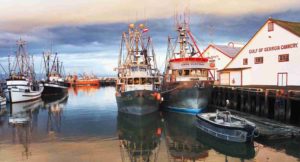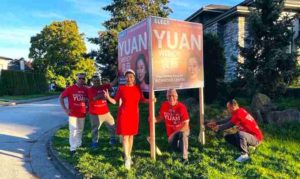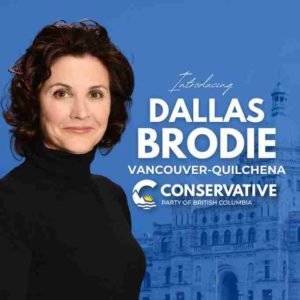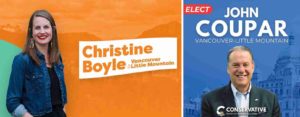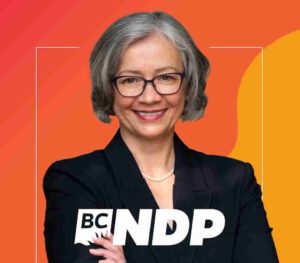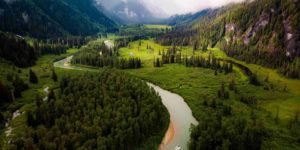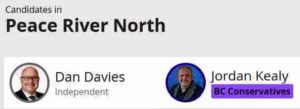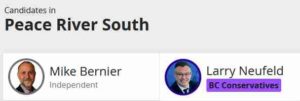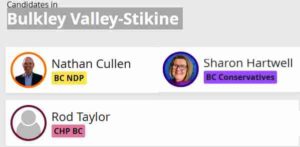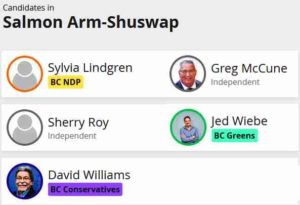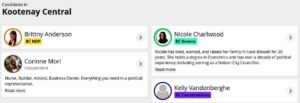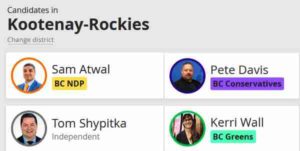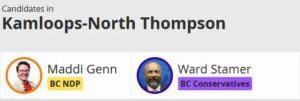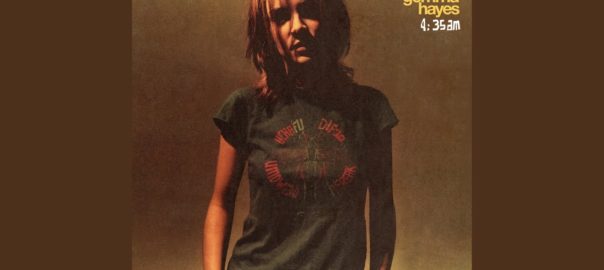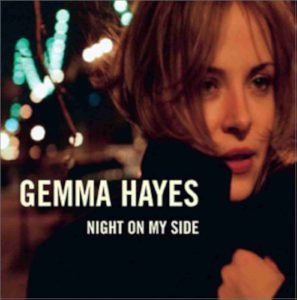
In the 2024 British Columbia election, Premier David Eby is once again seeking re-election in his home riding of Vancouver-Point Grey, a constituency known for its progressive values and highly educated voters.

To read Vote Mate candidate profiles of the Vancouver-Point Grey candidates, click here.
David Eby, leader of the British Columbia New Democratic Party (NDP) since November 2022, is facing several challengers, but the one drawing the most controversy is Paul Ratchford, the B.C. Conservative Party candidate.
Last week John Rustad dropped a candidate for homophobia & claimed he had re-vetted his candidates. He also needs to fire @P_Ratchford for this disgraceful attack on @elenoresturko as a “woke lesbian.” Abhorrent. #bcpoli pic.twitter.com/oq892J1Ebv
— Mable Elmore (@mableelmore) June 2, 2024
Mr. Ratchford’s incendiary, partisan remarks about his now fellow B.C. Conservative candidate Elenore Sturko, a former B.C. United MLA, have raised concerns about homophobia and intolerance, potentially shaping the tone of the election campaign in Vancouver-Point Grey, and beyond.
In response to Ms. Sturko’s victory in the Surrey South by-election in 2022, Mr. Ratchford called the just elected MLA a “woke, lesbian, social justice warrior.”
Such language immediately triggered a backlash.

Ms. Sturko — a wife, a mother, and a high profile longtime spokesperson for the Surrey RCMP detachment, as well as a novice candidate in 2022 running with the recently renamed B.C. United political party — was, as may be seen in the photo above, decidedly over the moon at her victory in the Surrey South riding.
Who, with any degree of integrity and humanity would seek to impinge in a partisan manner on Ms. Sturko’s good fortune in Surrey South, with a cruel comment on what must have been a joyous and halycon night for Elenore Sturko?
Ratchford, in referring to someone’s sexual orientation as part of a derogatory attack plays into harmful stereotypes and marginalizes the LGBTQ community.
Not new. Paul has been attacking @elenoresturko for years. pic.twitter.com/DkkEyOHOZQ
— Brad Barrett (@brad_barrett) June 3, 2024
The following day, Mr. Ratchford escalated his rhetoric by calling Ms. Sturko a “groomer,” a term long used in anti-LGBTQ narratives to falsely suggest LGBTQ individuals are trying to influence or “recruit” children into their community.
These remarks are not just harmful to Ms. Sturko, who has since joined the B.C. Conservative Party — in 2024, running in the riding of Surrey-Cloverdale — but also to the broader LGBTQ community, and voters at large.
The “groomer” trope is especially damaging as it revives debunked homophobic and transphobic fears that still resonate in some corners of society.
Employing such a term in modern political discourse reflects an effort to exploit those fears, polarizing communities and harming vulnerable individuals.

L-r, candidates for office in Vancouver-Point Grey: David Eby, Paul Ratchford & Devanyi Singh
For candidate Paul Ratchford running to unseat David Eby in Vancouver-Point Grey — an urban riding that has historically voted for progressive candidates — such comments are likely to alienate a significant portion of the electorate.
Vancouver-Point Grey is home to a socially conscious, diverse population that places a high value on inclusivity and equality.
The area has a substantial LGBTQ population, and its voters are likely to be repelled by the kind of divisive rhetoric Mr. Ratchford has employed.
Residents of the Vancouver-Point Grey riding, many of whom work in education, health care, and in the public service, are generally attuned to the implications of such inflammatory language, recognizing its potential to incite hate and discrimination. Mr. Ratchford’s injurious remarks will likely reinforce perceptions of the B.C. Conservative Party as out of touch with Vancouver-Point Grey’s values.
In addition to offending the LGBTQ community, B.C. Conservative candidate Paul Ratchford’s comments are also problematic for the broader electorate.

Many voters in Vancouver-Point Grey prize civility and fairness in politics.
Personal attacks, particularly those based on sexual orientation, are viewed as inappropriate, but also as distractions from substantive policy discussions.
While issues like housing affordability, health care, and climate change dominate the concerns of Point Grey and Kitsilano residents, Mr. Ratchford’s rhetoric may be seen as a diversion that detracts from addressing these pressing issues.
Given the gravity of his comments, the question arises: Has Paul Ratchford apologized to Elenore Sturko, now his fellow B.C. Conservative candidate, for his earlier hurtful and incendiary remarks?
As of yet, no public apology has been issued.
The absence of an apology underscores the broader challenge facing the B.C. Conservative Party under John Rustad’s leadership.
While Elenore Sturko’s defection to the B.C. Conservatives suggests the party is attempting to broaden its appeal, Mr. Ratchford’s explosive comments stand in stark contrast to this effort, signaling internal contradictions within the party.
At the upcoming all-candidates meeting in Vancouver-Point Grey, where both Paul Ratchford and incumbent Member of the Legislature David Eby will share the stage, Premier Eby is likely to address these remarks head-on.
As a strong advocate for human rights and social justice, David Eby could seize the moment to challenge Mr. Ratchford’s intolerant views, framing the contest as a battle between progressive values and regressive intolerance.
David Eby’s response would resonate with the riding’s electorate, many of whom value inclusion and equality as fundamental principles of good governance.
Given David Eby’s calm demeanour and legal expertise, Mr. Eby will likely approach the issue with a measured tone, appealing to voters’ sense of fairness while subtly highlighting the unsuitability of his opponent.
Meanwhile, the B.C. New Democratic Party’s “war room” has proven adept at capitalizing on their opponents’ missteps.
In July of this year, John Rustad met with an anti-vax group that is suing Dr. Bonnie Henry.
He said he regrets getting “the so-called vaccine” and accuses Dr. Henry of using it for “control on the population.” pic.twitter.com/m2h3IHAyK0
— BC NDP (@bcndp) September 23, 2024
With the release of footage earlier this week of B.C. Conservative leader John Rustad’s controversial views on COVID vaccines and his insinuation that Dr. Bonnie Henry’s rationale for decisions taken on how to fight COVID and keep British Columbians safe was, in his estimation, tied to efforts to ensure “population control,” … well, it’s entirely plausible the NDP might have additional material that could further undermine Mr. Ratchford’s credibility.
If the B.C. NDP possesses video of Paul Ratchford making similarly offensive comments about the LGBTQ community, they could release it strategically to reinforce the narrative that the B.C. Conservative Party harbours intolerant views.
Such a revelation would almost certainly derail Mr. Ratchford’s campaign, making it difficult for him to gain traction in a riding like Vancouver-Point Grey.
Ultimately, Paul Ratchford’s controversial remarks about Elenore Sturko are likely to be a significant liability in his campaign to unseat David Eby.
In a riding that embraces diversity and progressive values, Paul Ratchford’s mean-spirited and untoward commentary is out of sync with voters’ priorities.
As a result, Paul Ratchford’s contemptuous remarks could serve to strengthen David Eby’s chances for re-election, as voters in Vancouver-Point Grey seek a representative who reflects their commitment to tolerance, respect, and inclusivity.
The upcoming all-candidates meeting will offer a pivotal moment for these dynamics to play out in real time, potentially sealing the fate of Mr. Ratchford’s candidacy.




